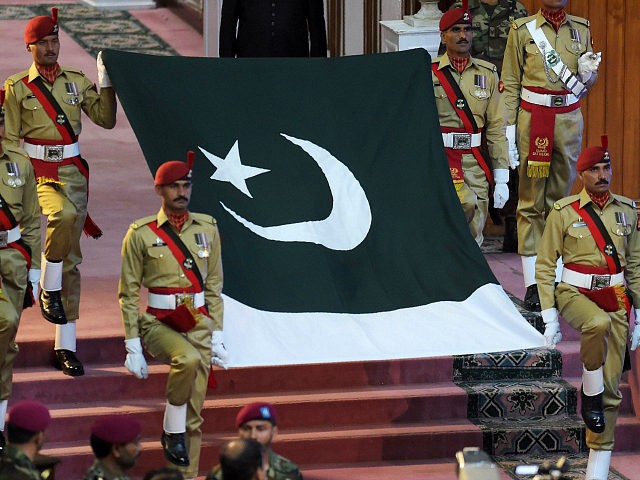Pakistan appears to be growing closer to its former Cold War adversary and fellow Taliban ally Russia as its relationship with the United States has soured over its reluctance to take action against terrorist groups.
“It is an opening,” Khurram Dastgir Khan, the defense minister of Pakistan, told Reuters. “Both countries have to work through the past to open the door to the future.”
“We have common ground on most issues at diplomatic levels,” Pakistan’s Prime Minister Shahid Khaqan Abbasi also told Reuters. “It’s a relationship that will grow substantially in the future.”
Pakistan’s Foreign Minister Khawaja Asif reportedly described Islamabad’s alliance with the West as a “historical error,” adding that the South Asian country is now seeking to build alliances closer with nations closer to home, namely China, Russia, and Turkey.
“We want to correct the imbalance of our foreign policy over 70 years,” Asif told Reuters. “We are not divorcing that relationship [with the West]. But we want to have a balance in our relationships; we want to be closer to our friends in our region.”
Khan pointed out that the recent tension with the United States may force Pakistan to rely on Russian military equipment.
The comments come less than a month after Russia and Pakistan announced a plan to establish a military commission to combat the growing Islamic State (ISIS/ISIL) wing in the region, accusing the United States of downplaying the jihadist group’s dangerous “proliferation” in Afghanistan.
“We have confirmed Russia’s readiness to continue boosting Pakistan’s counterterrorism capacity, which is in the entire region’s interests,” Foreign Minister Sergey Lavrov declared in Moscow on February 20, while briefing reporters alongside his Pakistani counterpart, Khawaja Asif.
“We are alarmed because unfortunately, U.S. military and NATO coalition in Afghanistan try to silence or deny these facts to give an impression that it [ISIS] is not a serious threat,” claimed Lavrov.
In its most recent assessment of the Afghan war, the Pentagon identifies the ISIS branch in the Afghanistan-Pakistan region as a threat.
Russia and Pakistan are enhancing their military, diplomatic, and economic ties, reveals Reuters, describing the Moscow-Islamabad relationship as nascent and adding that Pakistan’s top ally in the region China is the country primarily filling the void left by America.
Washington and Kabul have long accused Pakistan of harboring jihadists groups that are killing and maiming American forces and their allies in Afghanistan.
Marking a significant departure from steps taken by previous U.S. administrations against Islamabad’s support for terrorist groups in South Asia, American President Donald Trump has suspended an estimated $2 billion in aid to Pakistan for refusing to take decisive action against terrorist groups that operate in Afghanistan, namely the Taliban and its ally the Haqqani Network.
Moreover, the Trump administration convinced Britain, France, and Germany to add Pakistan to a terrorist watchlist maintained by the Financial Action Task Force (FATF), a global watchdog.
Now Reuters reports:
As U.S. influence in Islamabad wanes, Pakistan’s former adversary Russia is building military, diplomatic and economic ties that could upend historic alliances in the region and open up a fast-growing gas market for Moscow’s energy companies.
Russia’s embrace of Pakistan comes at a time when relations between the United States and its historical ally are unraveling over the war in Afghanistan, a remarkable turnaround from the 1980s, when Pakistan helped funnel weapons and U.S. spies across the border to aid Afghan fighters battling Soviet troops…a slew of energy deals and growing military cooperation promise to spark life into the Russia-Pakistan relationship that was dead for many decades.
The U.S. military has accused both Russia and Pakistan of lending support to the Afghan Taliban.
Russia argues that it is supporting the Taliban in their fight against the growing ISIS wing in the region, an allegation that the American military has dismissed as false.
Moscow has also hosted Afghan war peace negotiations with regional players, without the presence of the United States.
At the moment, both Afghanistan and the United States have offered an olive branch to the Taliban, but the terrorist group does not appear to be receptive to Afghan President Ashraf Ghani’s political power offer, reportedly maintaining the precondition of total withdrawal of U.S. forces before it engages in talks.
In addition to establishing a commission on military cooperation to combat ISIS, Moscow and Islamabad have also agreed to continue their annual military training exercises that began in 2016 and the sale of Russian military equipment to Pakistan.
China, the third largest weapons provider in the world, has historically been Pakistan’s top arms supplier.
Pakistan’s nemesis India, which stood with the Soviet team during the Cold War era, has expressed concern about Russia’s growing relationship with Islamabad.
A top Indian general has reportedly urged New Delhi to prepare for a two-front war with its fellow nuclear-armed neighbors and rivals China and Pakistan.

COMMENTS
Please let us know if you're having issues with commenting.